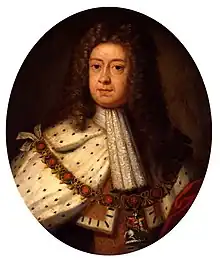The Wee German Lairdie
"The Wee German Lairdie" is a Scottish folk song probably ridiculing George I, King of Great Britain to the discontent of the Jacobite rebels, who instead recognised James Francis Edward Stuart as king, from the formerly ruling House of Stuart.[2] Though taking place around 1715, the song first appears in writing in 1810, in Robert Cromek and Allan Cunningham's Remains of Nithsdale and Galloway Song, recalling a song of several versions that was allegedly sung prior.[3][4] James Hogg, however, mentions "an older collection" in the first volume of his 1819 compilation The Jacobite Relics of Scotland.[5]
| "The Wee German Lairdie" | |
|---|---|
 George I of Great Britain, whom the song most likely mocked. Painted after Sir Godfrey Kneller, based on a work c. 1714.[1] | |
| Song | |
| Language | Scots |
| Written | Late 18th or early 19th century |
According to the The Jacobite Relics, the song was "sung to many different tunes in different districts of the kingdom". Hogg claimed that the most popular tune at the time was the one written by him, but printed alongside it an older tune which he described as "more in character".[6]
Background
The Jacobites had been present in Britain and Ireland since the deposition of James VII & II of Stuart for William III & II of Orange-Nassau, the former being a convert to Catholicism, to the antipathy of ardent protestants in English parliament.[7] Along with Catholics all across the realm, the cause for a continued Stuart monarchy became particularly popular in Scotland,[8] whence that house originated. Recovering from an infamous massacre of dissenters, defeats in battle, and laws put in place to restrict Catholicism in the kingdoms and from the crown, the Jacobite standard was raised once again in 1714 on the ascension of George I to the British and Irish thrones.[9]
The elector of Hanover, George I came from the Holy Roman Empire to a new land of which he was now king, was alleged to have spoken only a minimal amount of English.[10][11] The song suggests he was an avid gardener, something that isn't commonly (if at all) attested of him in surviving literature.
The notion of the song ridiculing George I in particular comes from its mid-19th century publications and commentary thereof.[4][12][13][14] Though unlikely, the time between the death of George I in 1727 and the song's first verified written appearance in 1810 suggests the possibility of it actually being about said king's son and successor, George II, involved in the Jacobite Rising of 1745.
Lyrics
The following Scots original is the song as it appears in James Hogg's Jacobite Relics of Scotland.[15]
| Scots (original)
18th or early 19th century |
English (translation)
21st century |
|---|---|
|
|
Recordings
- Ewan MacColl – Popular Scottish Songs, 1961[17]
- Nigel Denver – Rebellion!, 1967[18]
- Alastair McDonald – Scottish Battle Ballads, 1973[19]
- Five Hand Reel – Five Hand Reel, 1976[20]
- Jean Redpath – The Songs of Robert Burns, Volumes 5 & 6, 1985[21]
- Old Blind Dogs – New Tricks, 1992[22]
Notes
- Nithsdale and Galloway reads "foreign leeks"[16]
References
- "NPG 448; King George I - Portrait". National Portrait Gallery. Retrieved 6 October 2022.
- Perkins, McKenzie (27 August 2019). "Scotland's Jacobite Rebellion: Key Dates and Figures". ThoughtCo. Archived from the original on 6 October 2022. Retrieved 5 October 2022.
- Cromek, Robert Hartley (1810). Remains of Nithsdale and Galloway Song. London: T. Cadell and W. Davies. pp. 144–145.
- Cunningham, Allan (1825). The Songs of Scotland, Ancient and Modern. Vol. 3. London: John Taylor. p. 199.
- Hogg, James (1819). The Jacobite Relics of Scotland. Edinburgh: William Blackwood. p. 263.
- Hogg, James (1819). The Jacobite Relics of Scotland. Edinburgh: William Blackwood. pp. 262–263, 83–84, 85.
- "Glorious Revolution of 1688 - Definition & Summary - HISTORY". HISTORY. 22 September 2021. Retrieved 9 October 2022.
- Morrill, John S. (31 August 2022). "Jacobite | Meaning, Rising, and History | Britannica". Encyclopedia Britannica. Archived from the original on 9 October 2022. Retrieved 9 October 2022.
- Johnson, Ben. "The Jacobite Revolts: Chronology - Historic UK". Historic UK. Archived from the original on 9 October 2022. Retrieved 9 October 2022.
- Brain, Jessica (8 March 2021). "King George I - Historic UK". Historic UK. Archived from the original on 13 October 2022. Retrieved 13 October 2022.
- "George I (r. 1714-1727) | The Royal Family". The Royal Family. Archived from the original on 13 October 2022. Retrieved 13 October 2022.
- Whitelaw, Alexander (1843). The Book of Scottish Song. Blackie and Son: 1855. p. 520.
- Mackay, Charles (1861). The Jacobite Songs and Ballads of Scotland from 1688 to 1746. London and Glasgow: Richard Griffin and Company. pp. 5–16.
- The Edinburgh Monthly Review. Vol. 3. Edinburgh: Waugh and Innes. 1820. p. 515.
- Hogg, James (1819). The Jacobite Relics of Scotland. Edinburgh: William Blackwood. pp. 83–85.
- Cromek, Robert Hartley (1810). Remains of Nithsdale and Galloway Song. London: T. Cadell and W. Davies. p. 144.
- "Ewan MacColl - The Wee German Lairdee Lyrics | Genius Lyrics". Genius. Retrieved 19 October 2022.
- "Nigel Denver". Mainly Norfolk. Archived from the original on 19 October 2022. Retrieved 19 October 2022.
- "Alastair McDonald - Scottish Battle Ballads (1973, Vinyl) - Discogs". Discogs. Retrieved 19 October 2022.
- "Five Hand Reel". Mainly Norfolk. Archived from the original on 19 October 2022. Retrieved 19 October 2022.
- "Jean Redpath". Mainly Norfolk. Archived from the original on 19 October 2022. Retrieved 19 October 2022.
- "Old Blind Dogs - The Wee Wee German Lairdie Lyrics | Genius Lyrics". Genius. Retrieved 19 October 2022.